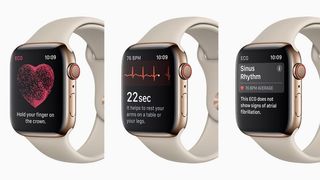The Apple Watch Series 4 Just Got Better At Assessing Your Heart Health
If you’re in the UK and Europe, that is, because the ECG feature has been approved

The heart rate monitor on the Apple Watch Series 4 is one of the best we’ve tested for accuracy on a wrist wearable, but until now we’ve only been scratching the surface of the device’s potential when it comes to heart health.
That’s because one of the key features of the Series 4 – the ability to take an electrocardiogram (ECG) – wasn’t available outside the USA, where the watch is an FDA-approved medical device. Now, after clinical trials proving its accuracy, the Series 4 has got the CE certification mark for use in the European Economic Area, with the UK and 19 other European nations now set to get the feature, and the ECG app has been added to the watch.
To enable ECG measurements you’ll have to update both your iPhone and Apple Watch (Series 4 only) to the latest software. Then go into the Apple Health app to set it all up and you’ll get a prompt to take your first ECG measurement on the watch, which you do by holding your finger on the digital crown for 30 seconds while keeping your arm still.
You’ll get one of three results from the test – sinus rhythm, AFib or inconclusive. Sinus rhythm means everything is normal, while AFib stands for atrial fibrillation, which means your heartbeat is irregular. If you get that result a few times it’s time to check in with your doctor. Inconclusive could mean that your heart rate was either too low (under 50bpm) or too high (over 100bpm) to take a reading, or that the watch was too loose or your arm too unsteady.
- Apple Watch Series 4 Review – A Big Upgrade
- The Best Heart Rate Monitors
- The Symptoms Of Heart Disease You Shouldn’t Ignore
Doing these checks regularly will provide valuable insight into your heart health, but a better plan of action is to set the watch to take regular ECG measurements when your arm is still throughout the day to automatically check for signs of atrial fibrillation. If it detects AFib on a few occasions, you’ll get a notification.
During testing to get the CE mark the Apple Watch Series 4 was compared with a gold standard 12-lead ECG in clinical trials on around 600 people, and found to be 98.3% accurate in detecting AFib and 99.6% accurate in detecting sinus rhythm in classifiable recordings. Of the readings taken, 87.8% could be classified by the ECG app on the watch.
The Apple Watch is pretty damn accurate then, and even if you just do a couple of tests for the novelty it’s absolutely worth trying the ECG if you do have the latest version of the watch. According to the NHS, atrial fibrillation affects around one million people in the UK. It’s not usually life-threatening, but can be uncomfortable and it’s absolutely something you should see your doctor about to check if treatment is required. Being able to take an ECG so easily with the Apple Watch could be genuinely important in maintaining good heart health, and is almost certainly a sign of things to come in terms of more wearables becoming medically-approved devices.
Get the Coach Newsletter
Sign up for workout ideas, training advice, reviews of the latest gear and more.

Nick Harris-Fry is a journalist who has been covering health and fitness since 2015. Nick is an avid runner, covering 70-110km a week, which gives him ample opportunity to test a wide range of running shoes and running gear. He is also the chief tester for fitness trackers and running watches, treadmills and exercise bikes, and workout headphones.
